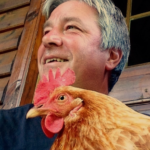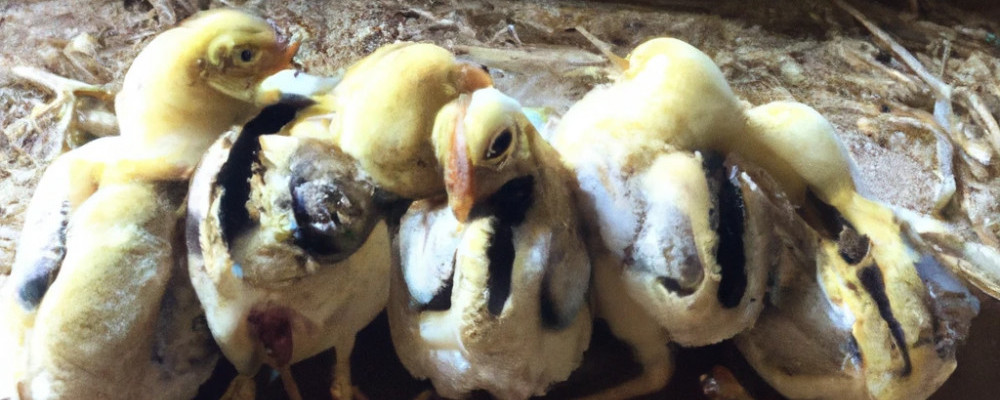The best way to ensure your chickens’ health is to keep things clean. Water needs to be fresh. Feed bins need to be closed to rodents and other pests. Nesting boxes, brooders, and coops need to be regularly hoed out and checked for infestation.
But sometimes, Mother Nature winds up and throws a fastball of internal and/or external disease or parasites at your flock, so it’s up to you to recognize the pitch and knock it out of the park. Sometimes, knowing what to do for a sick chicken is not easy. Hopefully, I can help.
Baby Chicks and Coccidiosis
One of the most common health issues to befall a baby chick is coccidiosis. Protozoan parasites from the genus Eimeria cause coccidiosis. It is a naturally occurring parasite that lives in a specific area of a chicken’s intestinal tract. Baby chicks are not likely to be affected negatively by coccidia if their brooding area is kept relatively free of manure. It is only when the chicks graze on manure due to a lack of feed or an overabundance of droppings that they get an overdose of the parasite.
Symptoms of coccidiosis include droopy posture, rough or ruffled appearance, wet poop with mucus, reduced consumption of feed, and weight loss. Bloody droppings are also a sign and a reason to take quick action.
Prevention of coccidiosis is achieved by cleanliness and also by the use of medicated chick feed. Adult chickens can also get the disease, although less commonly. Treat affected chicks and chickens by adding Amprolium to the chickens’ water supply. You can try dropper feeding if the birds are too sick to drink. Baby chicks are likely to live long, healthy lives if they reach the eight-week mark.
Fowl Cholera
Fowl cholera is an infectious disease caused by the bacterium Pasteurella multocida. It causes a high death rate in a flock and is transmitted by bird-to-bird transmission, eating infected feed and water, contact with dead birds, and infected droppings. Because death is so swift (6-12 hours), symptoms are hard to observe.
Rodents and other pests like skunks and raccoons can carry fowl cholera.
Once a flock is infected, the best treatment is to try to prevent the onset of the disease in the uninfected by administering antibiotics to drinking water. The living area of the flock must be completely cleaned out, including disinfection. Carcasses must be burned or buried so that the live birds cannot make further contact.
Avian Bird Flu
“Avian influenza or bird flu refers to the disease caused by infection with avian (bird) influenza (flu) Type A viruses. These viruses naturally spread among wild aquatic birds worldwide and can infect domestic poultry and other bird and animal species.- That’s from the CDC website.
The avian bird flu is a flu. It is spread from bird to bird, bird to other animals by ingesting carcasses, bird to hard surfaces, and on and on. The bottom line is that it acts just like influenza in people in that it has a devastating effect on the respiratory systems of its victims, especially the fragile victims, which all chickens are.
The flu has many symptoms: diarrhea, sluggishness, raspy breathing, hemorrhages of legs and feet, inflamed heads, reduced feed and water intake, and, in some cases, death. Egg production is obviously affected overall, but individual productivity is also reduced. Egg quality can also be affected.
The best way to fight the avian bird flu is to keep your flock from getting it in the first place. This may sound simple, but the threat comes from many paths. To protect your flock, you will want to isolate them from contact with wild bird sources like ducks and geese. That includes thoroughly cleaning your hiking shoes, or boots if you walk or hike in areas where you might pick up waterfowl manure.
If you add new chicks or chickens to your flock, you will want to isolate them for a few weeks to make certain that they are healthy. Don’t think that it can’t happen to you. The USDA has documented well over 700 cases, in both poultry and non-poultry specimens, of avian bird flu in the US since February 2022.
Keep your chickens away from varmints like raccoons, skunks, and opossums because they can be carriers, including rodents.
Marek’s Disease
Marek’s disease is a herpes virus that spreads through the air on skin and feather dust. Of course, when this dander lands, the litter is contaminated. Marek’s is extremely contagious and has some hideous symptoms, including paralysis, gray eyes, enlarged feather follicles, and tumors of internal organs. If your chickens get Marek’s, they probably won’t make it.
Prevention is really the only way to stave off the scourge of this disease. Baby chicks must be vaccinated on the day of hatching or while still in the egg. Vaccination is easy, and vaccines can be purchased online or at farm stores. Additionally, make sure the baby chicks that you buy are vaccinated.
Once a chicken gets Mareck’s, there is no treatment.
Paratyphoid
Otherwise known as salmonella, it can cause intestinal problems in your poults and chicks. Eggs can get salmonella on or in them when laid or from touching manure afterward.
Symptoms include drooping wings, diarrhea, excess peeping, huddling near heat, pasted vents, and closed eyes. Remember that these indicators are also common with other poultry illnesses, so your chicks may not have paratyphoid just because they exhibit some of these symptoms.
The easiest fix to paratyphoid is cleanliness, proper egg handling, and rodent and snake control (carriers). Treatment includes antibiotics and other drugs.
Happy, Healthy Chickens
By now, you’ve noticed that there is a common thread that runs through the entries above – cleanliness, tidiness, sanitation, etc.- that is very important to raising healthy chickens. While prevention can be a little tedious and monotonous, perhaps stopping your flock from getting disease is easier than treating them once they are sick. You can find medicine for prevention and treatment online or at any good farm store.
Although this list of maladies is not exhaustive, I hope you have found some good information on what to do for a sick chicken.
Thanks for reading. Let me know if you have any questions. I’ll be happy to help.
Dave

Chickenmethod.com



